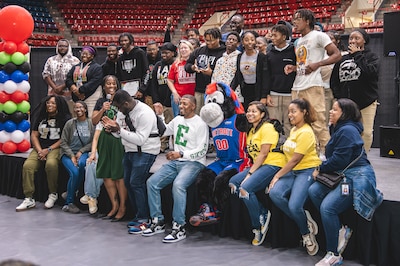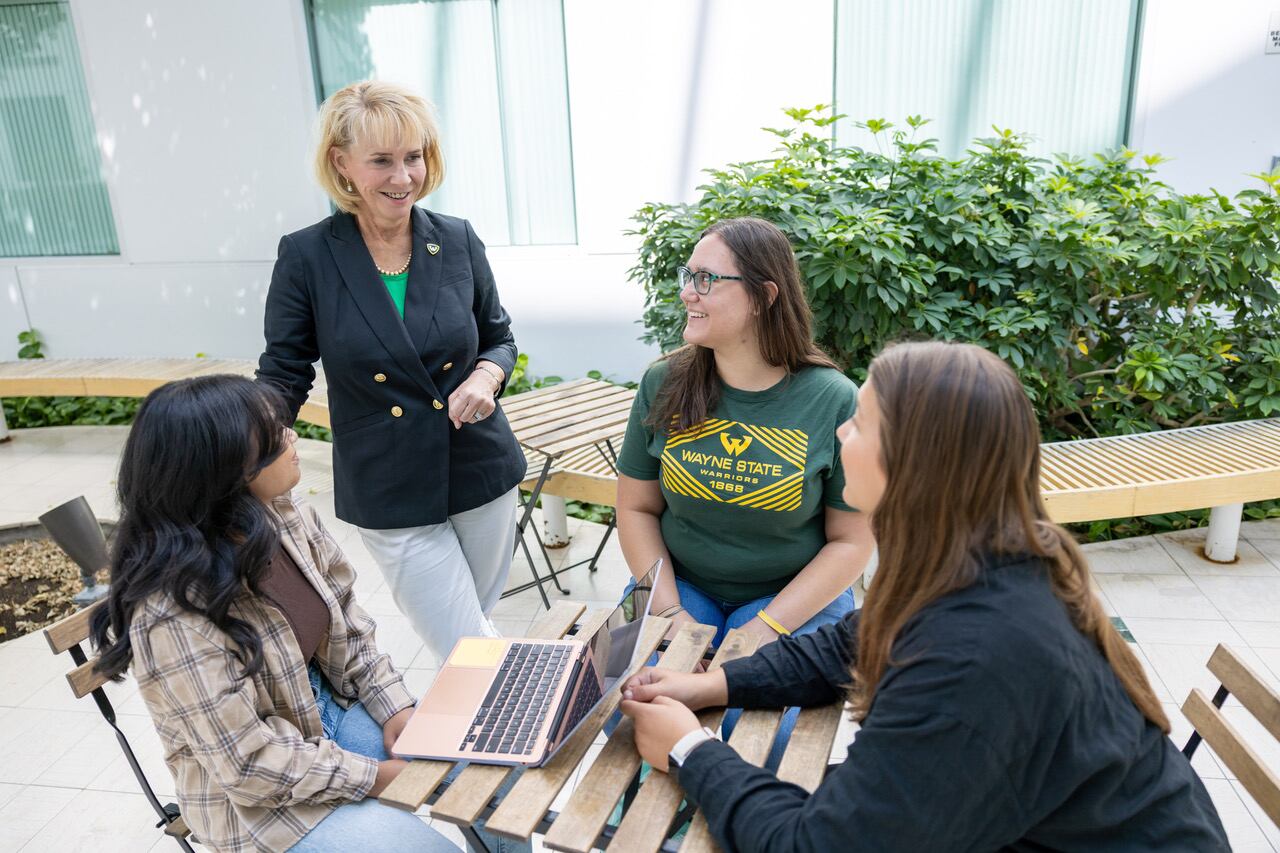As president of Detroit’s largest university, Kimberly Andrews Espy is never off the clock when it comes to engaging with students, faculty, and the community.
Nearly a year into her tenure, the Wayne State University leader said she considers that work a key part of her commitment to reaching more Detroit high school students and lessening enrollment barriers.
“We recognize coming to college is an investment,” Espy said in a recent interview with Bridge. “It’s an investment in yourself, it’s an investment in your family, and it’s an investment in the sense of meaning and purpose for a future.”
The university is dedicated to eliminating barriers for Detroit students, including meeting them at their schools, partnering on community events, making test scores optional on applications, and offering scholarships that cover full tuition.
There were 2,828 Detroit students enrolled at Wayne State for the fall of 2023, including 529 incoming undergraduate students, said Ericka Matthews-Jackson, Wayne State’s senior director of undergraduate admissions. The overall enrollment for incoming first-year students was 2,988.
The university’s recruitment team has a regular presence at Detroit high schools, Espy said, and teens are often invited to visit the campus for events like new and admitted student days. Wayne State also partners with the Detroit College Access Network for recruitment events and student assistance in completing college applications and the Free Application for Federal Student Aid, orFAFSA.
The university offers a scholarship program specifically catered to Detroit residents called the Heart of Detroit Tuition Pledge, which offers free tuition for students of Detroit high schools or residents earning a high school diploma. Wayne State is also one of 26 Michigan colleges that honors the Detroit Promise, an initiative administered by the Detroit Regional Chamber that ensures that any eligible student graduating from a high school in Detroit will have a tuition-free path to a two-year or four-year institution. For the 2023-24 school year, 443 students received the Heart of Detroit award and 125 students were part of the Detroit Promise program.
With the median annual income in Detroit averaging around $37,000, Espy understands the biggest barrier high school students face when enrolling in college is financial.
“When you couple the Pell (grant), the Michigan Achievement Scholarship and our own financial aid programs … you begin to have a widespread impact on the ability for students to be able to afford college,” she said. “This last fall 59% of our incoming class paid no tuition and no fees.”
Wayne State’s goal is to remove barriers to a college education
When it comes to student outreach in Detroit, Wayne State has a two-person recruitment team that works with high schools in Detroit Public Schools Community District as well as the city’s charter schools, Matthews-Jackson said.
“Typically, what happens is in the fall, we do high school visits and then we have special relationships with several schools, including Cass Tech, Renaissance, and Martin Luther King,” she said. “And we have designated days where our admissions counselors will go and meet with students who are interested in applying to Wayne State, help them complete their applications, and make sure that they’re getting the support and resources that they need.”
To reach students outside of school, the recruitment team partners with the Detroit College Access Network, a community-based organization dedicated to promoting higher education in the city. The two entities host college fairs and application nights, and Wayne State participates in the annual Metro Detroit Youth Day at Belle Isle.

Wayne State is also working to remove barriers in the application process. In 2020, the university made it optional for students to submit test scores from the ACT or SAT to be considered for admission. In addition, Wayne State is one of 10 universities in the Michigan Assured Admission Pact, which admits all Michigan high school students with a 3.0 GPA or above.
After students are accepted to the college, admission counselors help teens with next steps, like signing up for orientation and reviewing financial aid packages, Matthews-Jackson said. Counselors are busy during the summer too, meeting with kids at Wayne State summer camps offered to middle and high school students.
“We want to have more of a relationship with the students and families that we serve so by the time their student applies and is ready to make their admission decision, Wayne State is very familiar to them and they know that they belong here,” Matthews-Jackson said.
But this year, counselors faced two taxing challenges: DPSCD let go of many of its college transition advisors due to budget cuts, leaving some students with little to no support in school to navigate the college application process.
Then there was the botched rollout of the revamped FAFSA in December, compounded by subsequent processing errors. The rollout has left millions of U.S. families playing a waiting game with major implications for their household budget since the form is the gateway for students to qualify for a state scholarship program that could also reduce the cost of college. Students generally commit to colleges or universities by May 1, but this year several Michigan colleges, including Wayne State, pushed back deadlines because of the FAFSA problems.
In some cases, students are committing to a college or university without knowing how much aid they will receive, which could force tough financial decisions down the road. In other cases, students did not fill out the application, suggesting they may not attend college at all.
“We weren’t able to start sending out award letters until the middle to the end of April, which is very, very late,” Matthews-Jackson said.
Counselors visit schools like Cass and Renaissance on a weekly basis to provide support to students. The university also has a Detroit student ambassador program where Wayne State students who graduated from a Detroit high school talk to current high schoolers, Matthews-Jackson said. When it comes to FAFSA help, the Office of Student Financial Aid hosted several virtual and in-person FAFSA workshops. The next virtual workshop is on Monday while the next in-person event takes place Tuesday at the David Adamany Undergraduate Library.
As of this week, Wayne State has received 2,030 applications from students attending public, charter, and private schools in Detroit, Matthews-Jackson said. The university will accept applications for the fall 2024 semester through Aug. 1.
“So many of the students and families that we serve are Pell-eligible students, first generation students, and so, financial aid and affordability is very top of mind and something that’s a major consideration when they’re trying to determine where they’re going to apply, but also where they’re going to end up enrolling in college,” Matthews-Jackson said.
A key to college access is providing additional support to students
According to 2022 Census data, only 17% of Detroit residents have a college degree. That number is low compared to college rates in other cities and across the state, said Cyekeia Lee, the director of DCAN. That’s why the organization is following Gov. Gretchen Whitmer’s Sixty by 30 goal, which aims to have 60% of working-age adults obtaining a skill certificate or college degree by 2030.
Lee said her staff of seven works with more than 50 district and charter schools across Detroit to get students interested in college, and they provide professional development to Detroit-area counselors.
“We really work to help ensure that the counselor knows all of the college access things, just like we want every student to know the language,” Lee said. “The counselors are there to be trained and be supported.”
Staff are there to help students complete college applications and the FAFSA. To address the FAFSA fiasco, DCAN hosted FAFSA events at the Capital One Cafe downtown, Lee said.
Wayne State is DCAN’s top feeder school, with most students choosing to go to school close to home, the director said. Along with campus visits, the organization partners with the Detroit Promise to give students admitted to the university a special admissions day during the summer where they can talk to students and professors ahead of the first semester.
“They (Wayne State) offer a robust amount of scholarships and financial aid packages at no cost for students in the city of Detroit and so, that’s always a win with students,” Lee said. “A lot of students are excited to just be at a four-year institution in the heart of the city that can rival many of our neighboring colleges and institutions.”
Lee doesn’t have numbers for the Class of 2024 yet, but noted 1,852 Detroit high schoolers chose to attend Wayne State between 2019 and 2023. In contrast, 816 Detroit students have gone to Michigan State University, and 454 students attended the University of Michigan.
“We work the city,” Lee said. “We are the Detroit College Access Network. We don’t leave any school behind.”
Bridge Michigan Reporter Isabel Lohman contributed to this story.
Micah Walker is a reporter for Bridge Detroit. You can reach her at mwalker@bridgedetroit.com.





